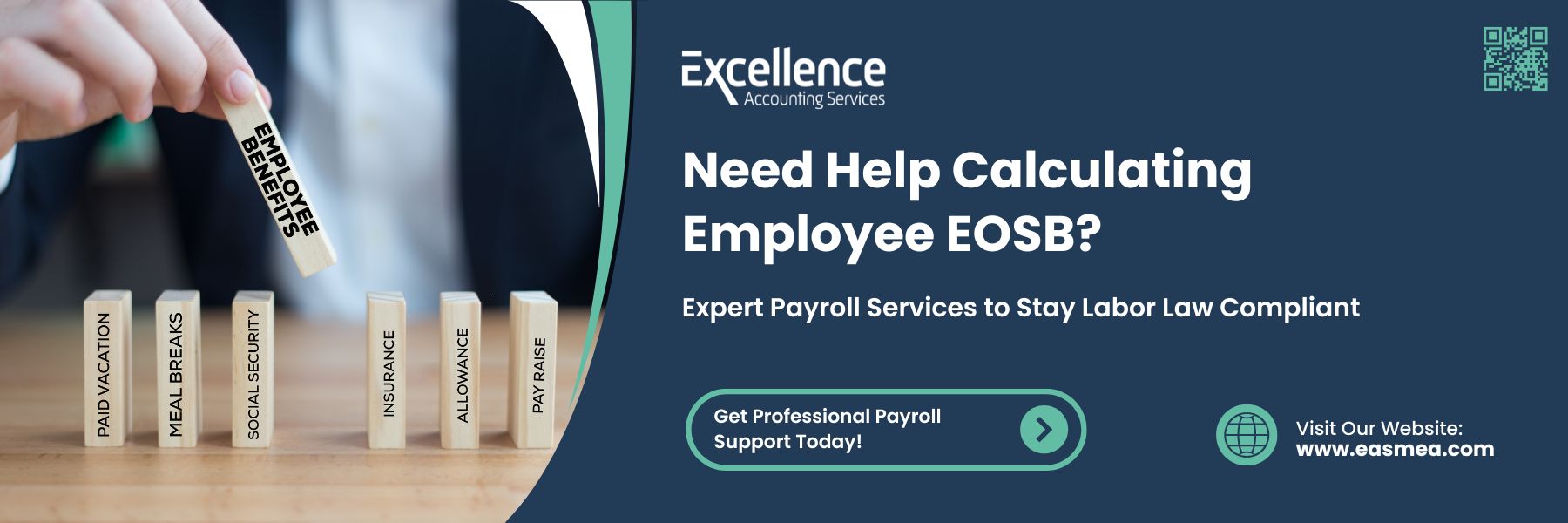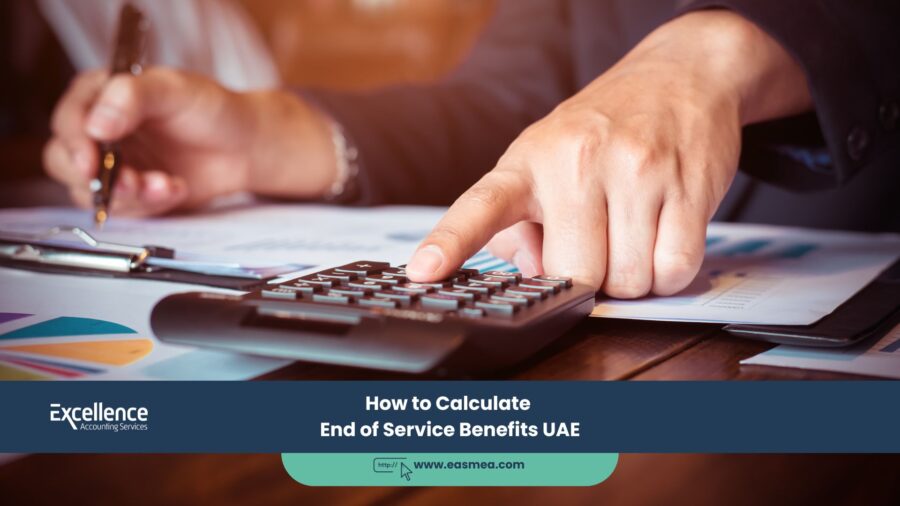Understanding your end of service benefits in the UAE is crucial for every employee. These benefits, also known as gratuity, are a lump sum payment an employee receives upon completion of their employment contract, provided they meet certain criteria. Calculating this entitlement accurately can be complex, as it depends on various factors like contract type, length of service, and salary. This comprehensive guide will break down the UAE labor law regarding end of service benefits, providing you with the knowledge and tools to calculate your dues accurately.
This post will cover everything from eligibility criteria and calculation methods to frequently asked questions and real-world examples. We’ll delve into the nuances of the UAE Labour Law, specifically focusing on end of service gratuity, and equip you with the information you need to confidently navigate this aspect of your employment.
Whether you’re approaching the end of your contract or simply want to be well-informed, this guide is your go-to resource for understanding end of service benefits in the UAE. We’ll also discuss the role of professional services in ensuring accurate calculations and compliance with the law.
Key Takeaways
- Understand the UAE Labour Law concerning end of service gratuity.
- Learn how to calculate your end of service benefits based on your contract type and length of service.
- Identify the factors that influence your gratuity calculation.
- Explore different calculation methods with clear examples.
- Gain insights into common FAQs regarding end of service benefits.
- Understand the importance of professional assistance in gratuity calculations.

Understanding UAE Labour Law for End of Service Benefits
The UAE Labour Law, specifically Federal Decree-Law No. 8 of 2020, outlines the regulations governing end of service benefits, ensuring employee rights are protected. It’s crucial to understand these regulations to accurately calculate your gratuity and ensure you receive what you’re entitled to. This law is designed to provide a framework for employer-employee relationships and protect the rights of both parties.
Contract Types and Gratuity Eligibility
The type of employment contract plays a significant role in determining your eligibility for end of service benefits. There are two main types of contracts: limited-term (fixed-term) and unlimited-term (indefinite-term) contracts. Understanding the distinctions between these contract types is fundamental to determining your gratuity rights.
Limited-Term Contracts: Employees on limited-term contracts are generally entitled to gratuity upon completion of the contract, regardless of resignation, unless terminated for reasons specified in Article 120 of the UAE Labour Law. This means that even if you choose not to renew your contract, you are still typically entitled to the gratuity accrued during your employment period.
Unlimited-Term Contracts: For unlimited-term contracts, gratuity eligibility depends on the length of service and the reason for leaving. Resignation after one year of continuous service generally entitles the employee to a portion of the gratuity. The amount of gratuity depends on the length of service. However, if an employee is terminated for reasons outlined in Article 120, they may forfeit their gratuity rights.
| Contract Type | Gratuity Eligibility |
|---|---|
| Limited-Term | Generally eligible upon completion, unless terminated per Article 120 |
| Unlimited-Term | Eligible based on length of service and reason for leaving; resignation after one year qualifies for partial gratuity |
Calculating Gratuity under UAE Labour Law
The calculation of end of service gratuity is primarily based on the employee’s last drawn basic salary and their length of service. However, the calculation method varies depending on the contract type and the reason for leaving. It is important to note that only the basic salary is considered for gratuity calculations; allowances, bonuses, and other benefits are excluded.
Basic Salary: Only the basic salary, as stipulated in the employment contract, is considered for gratuity calculation. This is a crucial point to remember, as many employees mistakenly include allowances in their calculations.
Length of Service: The total number of years of continuous service is a crucial factor. Even partial years of service are considered. For part-time employees, their service is calculated proportionally based on their working hours compared to a full-time employee.
Reason for Leaving: Resignation, termination by the employer (whether due to performance or redundancy), and completion of a limited-term contract have different implications for gratuity calculation. Understanding the specific reason for leaving is essential for accurate calculation.
| Length of Service | Gratuity Entitlement (Unlimited Contract – Resignation) |
|---|---|
| 1-3 years | 1/3 of 21 days’ salary for each year of service |
| 3-5 years | 2/3 of 21 days’ salary for each year of service |
| 5+ years | Full 21 days’ salary for each year of service |
Calculating End of Service Benefits in Detail
Let’s delve deeper into the practical application of the calculation methods, providing clear examples and scenarios to help you understand the process. It’s important to remember that these calculations are based on the basic salary only.
Step-by-Step Gratuity Calculation
Calculating your end of service benefits involves a few simple steps. First, determine your basic salary as per your employment contract. Then, calculate your total years and months of continuous service. Finally, apply the appropriate formula based on your contract type and reason for leaving.
Example: An employee with a basic salary of AED 10,000 and 5 years and 6 months of service on an unlimited contract who resigns would calculate their gratuity as follows: Since they have completed more than 5 years of service, they are entitled to the full 21 days’ salary for each year. Gratuity = (21/30 * AED 10,000) * 5.5 years = AED 126,000. (Note: 21/30 converts the daily salary to a monthly equivalent).
Important Considerations: Remember that the maximum gratuity payable is capped at two years’ basic salary. Also, any dues owed to the employer, such as outstanding loans or damages, can be legally deducted from the gratuity amount.
Real-World Examples and Scenarios
To further clarify the calculation process, let’s look at some real-world examples:
Scenario 1: An employee on a limited-term contract completes their two-year contract. Their basic salary is AED 8,000. Their gratuity would be calculated as: (21/30 * AED 8,000) * 2 years = AED 11,200.
Scenario 2: An employee on an unlimited contract resigns after two years and four months of service. Their basic salary is AED 12,000. They are entitled to 1/3 of 21 days’ salary for each year of service. Gratuity = (1/3) * (21/30 * AED 12,000) * 2.33 years = AED 6,533.33 (approximately).
Scenario 3: An employee on an unlimited contract is terminated by the employer after six years of service (not due to Article 120). Their basic salary is AED 15,000. Their gratuity would be calculated as: (21/30 * AED 15,000) * 6 years = AED 63,000. However, since the maximum gratuity is two years’ salary, they will receive (21/30 * AED 15,000) * 2 = AED 21,000.
Additional Factors Affecting Gratuity
While basic salary and length of service are the primary factors, other elements can influence the final gratuity amount. It’s crucial to be aware of these additional factors to accurately estimate your entitlement.
Deductions and Entitlements
Employers are entitled to deduct any outstanding dues from the employee’s gratuity. These dues may include unpaid loans, outstanding advances, or damages caused by the employee. The employer must have documented evidence to support these deductions.
Example: If an employee owes the company AED 5,000 in unpaid loans, this amount will be deducted from their calculated gratuity. It is important to maintain clear records of any financial transactions with your employer.
Probation Period and Unpaid Leave
The probation period, as specified in the employment contract, is included in the calculation of the total length of service for gratuity. Unpaid leave, however, is generally not included in the calculation, as it represents a period where the employee was not actively working.
Highlights:
- Outstanding dues, with proper documentation, can be deducted from gratuity.
- Probation period is included in length of service calculations.
- Unpaid leave is generally not included in length of service calculations.
- The maximum gratuity is capped at two years’ basic salary.
- Gratuity is calculated based on the basic salary only, excluding allowances and other benefits.
- Part-time employees’ service is calculated proportionally.
- Resignation from an unlimited contract after one year entitles the employee to a portion of the gratuity.
- Termination under Article 120 of the UAE Labour Law may result in forfeiture of gratuity.
- The reason for leaving the company significantly impacts gratuity entitlement.
- It’s crucial to consult the UAE Labour Law or seek professional advice for specific situations.
What Excellence Accounting Services Can Offer
Excellence Accounting Services can assist you in accurately calculating your end of service benefits, ensuring compliance with UAE Labour Law. Our team of experienced professionals is well-versed in the intricacies of the law and can provide personalized guidance tailored to your specific situation. We understand that navigating these regulations can be complex, and we’re here to simplify the process for you. We offer a range of services to support you:
- Gratuity Calculation and Advisory Services: We provide precise gratuity calculations based on your individual circumstances, considering all relevant factors such as contract type, length of service, and salary. We also offer advisory services to help you understand your entitlements and obligations.
- Labour Law Compliance Assistance: We assist businesses in ensuring compliance with UAE Labour Law regarding end of service benefits. This includes developing compliant policies and procedures, conducting audits, and providing training to HR staff.
- Payroll Management and Processing: Our payroll management services ensure accurate and timely processing of salaries, including the calculation and disbursement of end of service benefits. We use advanced payroll software to minimize errors and ensure compliance.
- Contract Review and Advisory: We review employment contracts to ensure they are in line with UAE Labour Law and advise on any potential issues related to end of service benefits. This service helps both employers and employees understand their rights and responsibilities.
Frequently Asked Questions (FAQ)
Here are some frequently asked questions regarding end of service benefits in the UAE, designed to provide comprehensive answers and clarify common misunderstandings. Understanding these nuances is crucial for both employees and employers to ensure compliance with the UAE Labour Law and maintain a fair and transparent working environment.
Navigating the complexities of gratuity calculations often leads to questions about the maximum amount payable. While the calculation considers length of service and basic salary, there’s a crucial ceiling to be aware of.
The maximum gratuity payable is capped at two years’ basic salary, regardless of the length of service. This provision sets a limit on the gratuity amount, even for long-serving employees who have dedicated many years to a company. It’s essential to factor this cap into your calculations, especially if you have worked for an employer for a significant number of years, as your calculated gratuity based on years of service might exceed this limit.
Understanding this cap is crucial for financial planning and realistic expectations regarding your end-of-service benefits.
| Factor | Detail |
|---|---|
| Maximum Gratuity | Two years’ basic salary |
| Applicability | Applies regardless of length of service |
| Importance | Essential for financial planning |
Part-time employment is increasingly common, and understanding how gratuity applies to these roles is important. The calculation takes into account the reduced working hours compared to full-time employees.
For part-time employees, the length of service is calculated proportionally based on their working hours compared to a full-time employee in the same role. The gratuity is then calculated based on this proportional service and their basic salary. For example, if a part-time employee works half the hours of a full-time employee, their length of service for gratuity calculation will be halved.
This ensures fair compensation for part-time employees, reflecting their actual contribution to the company. It is vital to have a clear understanding of what constitutes full-time hours within your company to accurately calculate the proportional service for part-time staff.
- Proportional Calculation: Based on working hours relative to full-time employees.
- Fair Compensation: Reflects the actual contribution of part-time staff.
- Clear Definition: Essential to define full-time hours for accurate calculation.
Resignation from an unlimited contract has specific implications for gratuity entitlement. It’s not simply a matter of receiving the full amount after a certain period.
No, if you resign from an unlimited contract after one year, you are entitled to a portion of the gratuity, not the full amount. The entitlement increases with the length of service, as per the provisions of the UAE Labour Law.
The amount you receive will depend on how many years you have completed, with the law outlining specific percentages or fractions for different service durations. This system encourages employee retention and recognizes the increasing value of an employee’s contributions over time. It’s crucial to consult the UAE Labour Law or your employment contract to understand the specific accrual rates for gratuity based on length of service.
| Length of Service | Gratuity Entitlement (Unlimited Contract – Resignation) |
|---|---|
| 1-3 years | 1/3 of 21 days’ salary for each year of service |
| 3-5 years | 2/3 of 21 days’ salary for each year of service |
| 5+ years | Full 21 days’ salary for each year of service |
Article 120 outlines specific circumstances under which an employee’s gratuity rights can be affected. Understanding these circumstances is crucial.
If you are terminated for reasons specified in Article 120, such as gross misconduct, theft, or serious breach of contract, you may forfeit your entitlement to end of service benefits. It’s crucial to understand the specific provisions of Article 120, as these are serious offenses that can result in the loss of your gratuity.
These provisions are designed to protect employers from employee misconduct that significantly harms the company. It’s advisable to seek legal counsel if you believe you have been unfairly terminated under Article 120.
- Specific Offenses: Gross misconduct, theft, serious breach of contract.
- Forfeiture of Gratuity: Possible consequence of termination under Article 120.
- Legal Counsel: Recommended if you believe termination was unfair.
While gratuity is an employee entitlement, there are certain situations where deductions can be made. These deductions must be legitimate and properly documented.
Yes, your employer can deduct any outstanding dues you owe them, such as unpaid loans, outstanding advances, or damages you caused to company property, from your gratuity. These deductions must be justified and documented.
The employer cannot make arbitrary deductions. It’s essential to maintain clear records of any financial transactions with your employer to avoid misunderstandings or disputes regarding deductions from your gratuity. Transparency and documentation are key to ensuring a fair process.
| Deduction Type | Examples |
|---|---|
| Outstanding Loans | Personal loans from the company |
| Advances | Salary advances |
| Damages | Damage to company property |
The probation period is a common part of employment contracts, and its impact on gratuity calculations is a frequent question.
Yes, your probation period, as specified in your employment contract, is typically included in the calculation of your total length of service for the purpose of gratuity calculation. This means that your probation period contributes to your overall service time for gratuity purposes. Even though it’s a probationary period, it’s still considered a period of employment with the company.
- Included in Calculation: Probation period counts towards total service.
- Period of Employment: Considered part of the overall employment duration.
The basic salary is a crucial element in gratuity calculations, but its definition can sometimes be unclear.
The basic salary is the fixed component of your salary as stipulated in your employment contract. It excludes allowances, bonuses, commissions, and other variable pay elements. Only the basic salary is used for gratuity calculation.
This is a critical point to remember when calculating your gratuity, as many employees mistakenly include allowances and other benefits in their calculations, leading to inaccurate estimations.
| Salary Component | Included in Gratuity Calculation? |
|---|---|
| Basic Salary | Yes |
| Allowances | No |
| Bonuses | No |
| Commissions | No |
Company restructuring can raise concerns about employee entitlements, including gratuity. The law protects employee rights in such situations.
In the event of a company sale or merger, your employment contract typically continues with the new entity. Your length of service remains continuous, and your gratuity entitlement is preserved.
Your rights are protected under the law, and your gratuity entitlement is not affected by the change in ownership. The new company assumes the responsibility for fulfilling the existing employment contracts, including the obligation to pay end-of-service benefits.
- Continued Contract: Employment contract continues with the new entity.
Preserved Entitlement: Gratuity entitlement remains unaffected.
Commission-based salaries present a unique challenge when calculating gratuity. There needs to be a clear method for determining the basic salary component.
For employees on commission-based salaries, the basic salary for gratuity calculation is usually determined based on the average of their earnings over a specific period, typically the last 12 months of employment.
The employment contract should clearly define how the basic salary is determined in such cases. This ensures a fair calculation of gratuity for commission-based employees, taking into account their fluctuating income. It’s important to have a well-defined formula in the employment contract to avoid any ambiguity.
- Averaging Earnings: Typically based on the last 12 months’ earnings.
Contractual Definition: The employment contract should specify the calculation method.
Accessing reliable information about the UAE Labour Law is crucial for both employers and employees.
You can find detailed information about the UAE Labour Law on the website of the Ministry of Human Resources and Emiratisation (MOHRE). Consulting with a legal professional specializing in UAE labour law is also advisable for specific situations or complex cases.
The MOHRE website is the official source for information on UAE Labour Law and provides comprehensive details on various aspects of employment, including end-of-service benefits. It’s always recommended to consult the official source for the most accurate and up-to-date information.
- MOHRE Website: Official source for UAE Labour Law information.
- Legal Counsel: Recommended for complex situations and specific advice.
Understanding the intricacies of the UAE Labour Law, particularly concerning end-of-service benefits, is paramount for both employees and employers. This FAQ section has addressed some of the most common queries, offering detailed explanations and clarifying potential misunderstandings.
By staying informed and seeking professional guidance when necessary, you can ensure a fair and transparent employment relationship, safeguarding the rights and entitlements of all parties involved. Remember, the UAE Labour Law is designed to protect both employers and employees, and a thorough understanding of its provisions is essential for a harmonious and productive work environment.
Conclusion
Navigating the complexities of end of service benefits in the UAE requires a thorough understanding of the UAE Labour Law. This guide has provided a comprehensive overview of the key aspects, from eligibility criteria and calculation methods to frequently asked questions.
By understanding your rights and entitlements, you can ensure you receive your due gratuity upon completion of your employment contract. Remember, accurate calculation is crucial, and seeking professional advice from Excellence Accounting Services can be beneficial, especially in complex situations.




